Our certifications
Our vision is to feed the population in a sustainable way that respects our planet and allows local communities to thrive. Seeking independent third-party sustainability and food safety certification of our operations according to science-based, rigorous and robust certification programs is key to achieving this goal.
Nutreco certification tables


|
Nutrace |
The International Organization for Standardization (ISO) |
GLOBALG.A.P. |
Aquaculture Stewardship Council (ASC) |
|---|---|---|---|
|
Nutrace is Nutreco’s company-wide management programme that ensures feed-to-food quality and safety. All Nutreco’s companies are required to adhere to Nutrace standards. |
ISO is an independent, international non-governmental organisation, convening global experts to establish optimal practices in areas from product creation to process management. Their overarching mission centers on enhancing lives universally by simplifying, ensuring safety, promoting overall well-being and fostering global improvement and accessibility. |
GLOBALG.A.P. offers smart farm assurance solutions, certifying agriculture, aquaculture, and floriculture in over 130 countries, focusing on standards for production, supply chains, and worker welfare. They partner with supply chain stakeholders to promote globally sustainable and safe farming practices. |
Collaborating with partners, ASC focuses on transforming global seafood farming, emphasizing environmental sustainability and social responsibility. They set stringent standards and ensure high assurance across the supply chain, aiming to make aquaculture more sustainable, in collaboration with partners like the Dutch Sustainable Trade Initiative IDH and WWF Netherlands. |
|
Best Aquaculture Practices (BAP) |
Naturland |
HALAL |
Hazard Analysis Critical Control Points (HACCP) |
|---|---|---|---|
|
BAP is a third-party certification program within the Global Seafood Alliance (GSA) that ensures responsible aquaculture. BAP promotes global seafood practices to ensure a future with abundant, safe and ethically sourced seafood. BAP is the sole aquaculture organisation providing both certification and membership. |
Naturland certification assures consumers that products meet rigorous ecological and social standards and are accredited by the ISO/IEC 17065 standard. Naturland is dedicated to improving food security, smallholder productivity, and sustainable development in organic agriculture. |
Halal certification addresses the global demand for products adhering to Islamic dietary requirements. It ensures compliance with Islamic Law, promoting purity, safety, and ethical practices in goods and services, enhancing marketability internationally. |
HACCP is a certificate that ensures food safety regarding biological, chemical, and physical hazards in production processes. The certificate aims to avoid hazards before obtaining the final product and reduce risks safely. |
Label Rouge |
Good Manufacturing Practice (GMP) |
Food Safety System Certification (FSSC) |
Final Quality Control (FQC) |
|
Label Rouge, a French quality label, denotes products of superior quality, emphasizing production, taste, and manufacturing processes. Open to diverse products, it is awarded based on INAO-validated specifications, ensuring high quality through production conditions, product image, and presentation. Label Rouge can coexist with Protected Geographical Indication or Traditional Speciality Guaranteed but not with an original (AOC/PDO). |
GMP is a program that aims at food safety, guarantees a safe process from harvesting to production, and ensures the work is carried out in a responsible way towards people and the environment. |
FSSC, a global non-profit, fosters trust and positive impact in the consumer goods industry. It oversees ISO Management System-based certification and related programs independently, aiming to ensure their reliability and effectiveness, to enhance the credibility of the consumer goods sector. |
FQC, a UAE-based third-party assessment company, specializes in ISO management system certifications, aiming to enhance global competitiveness by implementing quality management standards. Their mission is to promote quality, health and safety, food safety, and environmental cleanliness for profitable and globally competitive organisations. |
|
RCNA Standard |
FeedSafe |
Punto Verde |
Debio |
|---|---|---|---|
|
The RCNA standard (Certification Standard Animal Nutrition) ensures that manufacturers and distributors of all feed and premixes comply with European Regulations and specific French sector requirements. |
FeedSafe enhances the commitment to quality assurance and risk mitigation in animal feed production. It mandates HACCP implementation by feed manufacturers for accreditation, focusing on reducing feed safety risks for livestock. |
Punto Verde, certified by the Ecuadorian Ministry of Environment, promotes environmentally friendly practices and carbon reduction in companies, recognizing those contributing to sustainable production. Aligned with the Ecuador Zero Carbon Program, it acknowledges firms actively mitigating climate change through footprint reduction. |
Debio provides certification services, including the Ø-label for imported products meeting Norwegian regulations and the inspection of organic production aligned with local and EU standards. Their certification extends to Organic Aquaculture, including fish farming. About Debio |
| OVOCOM | Verband Lebensmittel Ohne Gentechnik (VLOG) | FAMI-QS |
Animal and Plant Health Inspection Service (APHIS) |
|---|---|---|---|
|
OVOCOM is a Belgian consultation platform dedicated to the feed sector. Committed to ensuring reliable, credible and affordable feed safety systems, OVOCOM works with feed companies to maintain quality across the production, trade, storage, and transport chain. |
VLOG certification ensures GMO-free food for the German market. Essential for trading with German retailers, it guarantees compliance with strict criteria, promoting consumer preferences for GMO-free products and safeguarding against genetic engineering deregulation |
FAMI-QS is the leading certification scheme for specialty feed ingredients and mixtures, ensuring suppliers adhere to proper risk management measures for feed quality and safety. The accredited standard covers a comprehensive range of specialty ingredients and aims to guarantee hygienic and safe production practices, fostering excellence and trust in specialty feed ingredients globally. |
For almost 50 years, APHIS has safeguarded America's agricultural and natural resources, focusing on animal and plant health, welfare, biotechnology, wildlife management, and global trade. The agency's multifaceted efforts include protecting air travel, sheltering pets during disasters, and preserving trees. |
| European Union Organic (EU-Organic) | A-Futter | Feed Materials Assurance Scheme (FEMAS) | Pastus+ AMA |
|---|---|---|---|
|
EU-Organic certification ensures adherence to strict EU standards for organic farming, processing, and trading Certified companies can display the official EU organic logo. Effective under the EU Organic Regulation 2018/848, the certification fosters the growth of organic farming, with strengthened control systems and rules ensuring uniform standards for imported organic products. |
A-Futter, initiated by the Bavarian Farmers' Association and the German Animal Feed Association, is a quality assurance program ensuring meat quality in Bavaria. It mandates certified A-feed for farms in "Verified Quality Bavaria," conducting annual checks on compound feed manufacturers to maintain quality standards and compliance.
|
FEMAS ensures safe practices in the UK feed chain for food-producing animals, providing accredited assurance of feed ingredients owned by the Agricultural Industries Confederation. Based on HACCP principles, FEMAS aims to protect human and animal health, verify industry compliance with feed safety legislation, and engage stakeholders in continuous improvement. |
The Pastus+ AMA certification program ensures feed safety and quality "from field to fork," with independent annual checks exceeding legal requirements. Covering feed production, trade, transport, and storage, it aligns with programs like the AMA Quality Seal, requiring exclusive use of Pastus+ certified feed for farmers to display the AMA seal. |
| Safe Feed/Safe Food | Restricted Use Protein Products (RUPP) |
Sindirações |
SQF Food Safety Code for Food Manufacturing |
|---|---|---|---|
|
The Safe Feed/Safe Food certification program, initiated by American Feed Industry Association (AFIA) and administered by the Safe Quality Food Institute (SQFI), ensures food and feed safety, exceeding regulations and promoting continuous improvement. It reflects a commitment to providing high-quality feed for domestic livestock, fish, and pets for a safe and sound food supply. |
The RUPP program involves independent certifying auditors assessing facilities using restricted protein products, reviewing procedures, and issuing interim certifications. It ensures compliance with FDA regulations 21 CFR 589.2000/2001, ensuring facilities adhere to guidelines and do not incorporate prohibited mammalian protein products or cattle material in animal feed. |
Sindirações, as the voice of the animal feed industry, works towards a competitive environment and safe food production in Brazil through government engagement, policy shaping, global harmonization, education promotion, and advocacy for research. |
The SQF Food Safety Code for Food Manufacturing, recognized by GFSI, ensures food safety in sectors like dairy, bakery, and fruit processing. Administered by the SQF Institute, it offers globally recognized certification programs, industry-specific codes, and compliance with GFSI standards. |
| SQF Food Safety Code for Food Manufacturing | WELFAIR | INTERPORC ANIMAL WELFARE SPAIN (IAWS) | Ibérico Animal Welfare (IBAW) |
|---|---|---|---|
|
The SQF Food Safety Code for Food Manufacturing, recognized by GFSI, ensures food safety in sectors like dairy, bakery, and fruit processing. Administered by the SQF Institute, it offers globally recognized certification programs, industry-specific codes, and compliance with GFSI standards, gaining approval from significant retailers and food service providers, aligning with its mission to deliver consistent food safety and quality certification programs. |
The Welfair® certification is an independent, science-based animal welfare certificate relying on European standards. With a strong emphasis on direct observation, it comprehensively evaluates and monitors animal welfare across farms, rearing areas, and slaughterhouses. |
IAWS, the INTERPORC certification, guarantees animal welfare, health, biosafety and traceability in the Spanish white pig food chain with the "Welfare Commitment Certified" seal that goes beyond EU regulations and upholds the "Five Freedoms" of animal welfare. |
The IBAW certification, developed by Asociación Interprofesional del Cerdo Ibérico (ASICI), ensures adherence to the World Organization for Animal Health's principles, surpassing EU regulations. Its pioneering IBERIAN ANIMAL WELFARE SEAL signifies a commitment to high standards in animal welfare, health, biosafety, and traceability in Iberian pig products. |